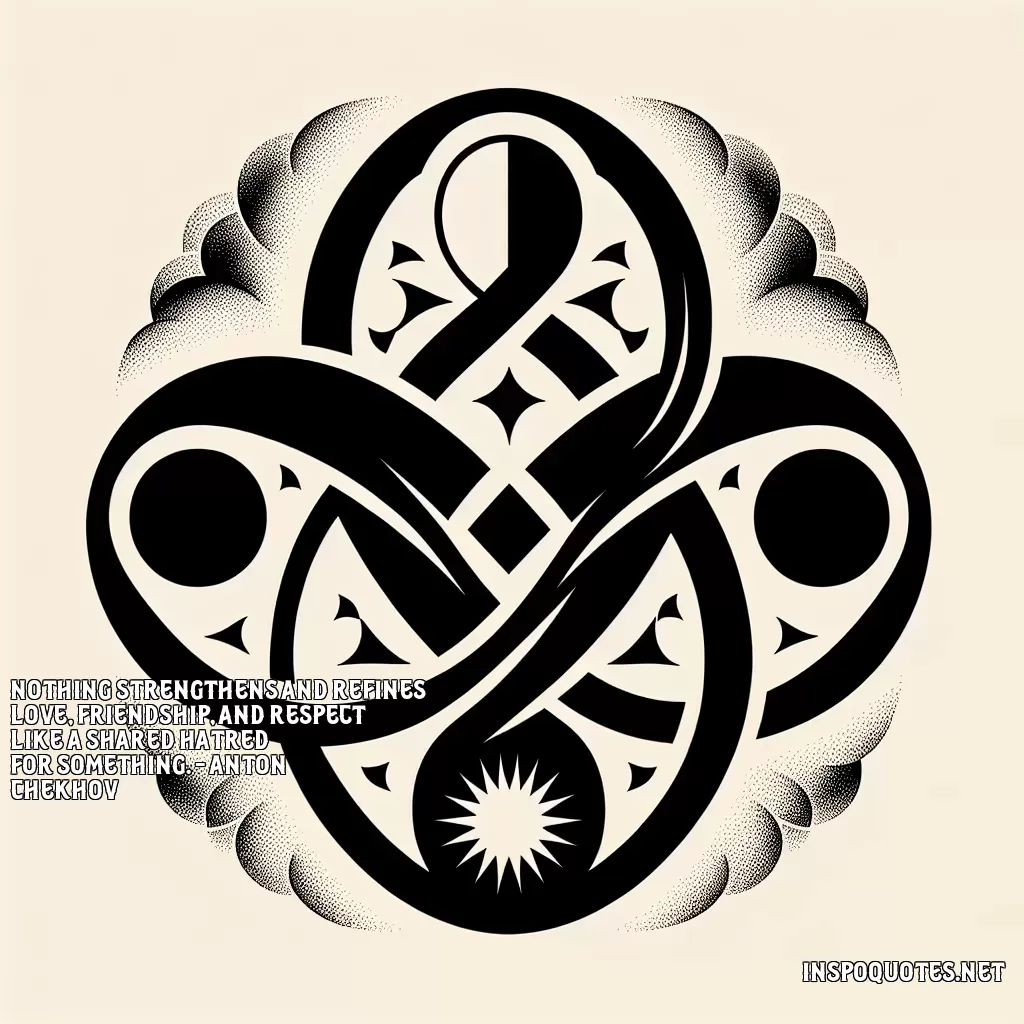
Nothing strengthens and refines love, friendship, and respect like a shared hatred for something. - Anton Chekhov

Nothing strengthens and refines love, friendship, and respect like a shared hatred for something. - Anton Chekhov
Anton Chekhov's quote, "Nothing strengthens and refines love, friendship, and respect like a shared hatred for something," speaks to the idea that human connections often grow stronger through mutual opposition to a common adversary or dislike. At its core, the quote highlights the social and psychological phenomenon where individuals bond more deeply when they share intense emotions, particularly negative ones. When two or more people come together over a common dislike or hatred, be it a rival sports team, an oppressive system, or even a disliked colleague, they find common ground. This shared sentiment creates a sense of camaraderie and unity, as they join forces against an outside entity. The mutual understanding and agreement on what they oppose can lead to intense interactions and dialogues, which can deepen their understanding of each other. This depth can further cement their bond in love, friendship, or respect because they feel that they are not alone in their feelings. Chekhov's insight reflects a paradox in human relationships: while positive experiences and shared joys undeniably forge connections, the experience of a shared adversity or antagonist can be just as powerful, if not more so. In navigating and discussing these negative feelings together, individuals refine their perceptions of each other, often leading to greater empathy, understanding, and solidarity. The quote reminds us that even negative emotions, when shared, have the potential to yield positive relational outcomes by bringing individuals closer together. It also alludes to the dynamics of group identity—how individuals rally and strengthen bonds within their group by contrasting it against an external 'other.'
Quote By: Anton Chekhov
Anton Chekhov, born on January 29, 1860, in Taganrog, Russia, emerged as one of the most influential playwrights and short story writers in the history of literature. The son of a grocer, Chekhov hailed from modest beginnings, and his early life was marked by hardship. His father’s strict discipline and his family’s financial difficulties propelled him toward literature as both a refuge and a means of income. After completing his education at the Taganrog Gymnasium, Chekhov moved to Moscow in 1879 to study medicine at Moscow University, where he would later earn his medical degree in 1884. His medical background would heavily influence his writing, especially in terms of understanding human nature and the complexities of life.
Chekhov began his literary career by publishing short stories in magazines to support his family. By the late 1880s, he had gained recognition for his poignant tales that captured the nuances of ordinary life, often infused with subtle humor and existential reflections. Notable works from this period include stories such as “The Lady with the Dog” and “The Bet,” which showcase his signature style of understated realism and deep psychological insight.
In addition to his short stories, Anton Chekhov revolutionized the theatrical world with his plays. His works, including "The Seagull," "Uncle Vanya," "Three Sisters," and "The Cherry Orchard," broke away from the melodrama of the past and introduced more complex characters and intricate emotional landscapes. Chekhov’s plays often explore themes of unfulfilled desires and the passage of time, resonating with audiences across generations.
Despite his literary achievements, Chekhov remained dedicated to his medical practice. He often remarked that being a physician allowed him to observe life more closely, which ultimately enriched his writing. Tragically, Anton Chekhov's life was cut short when he succumbed to tuberculosis on July 15, 1904, in Yalta, Crimea. Today, he is celebrated as a master of the short story and a pioneer of modern drama, leaving a lasting legacy that continues to influence writers and playwrights around the world.